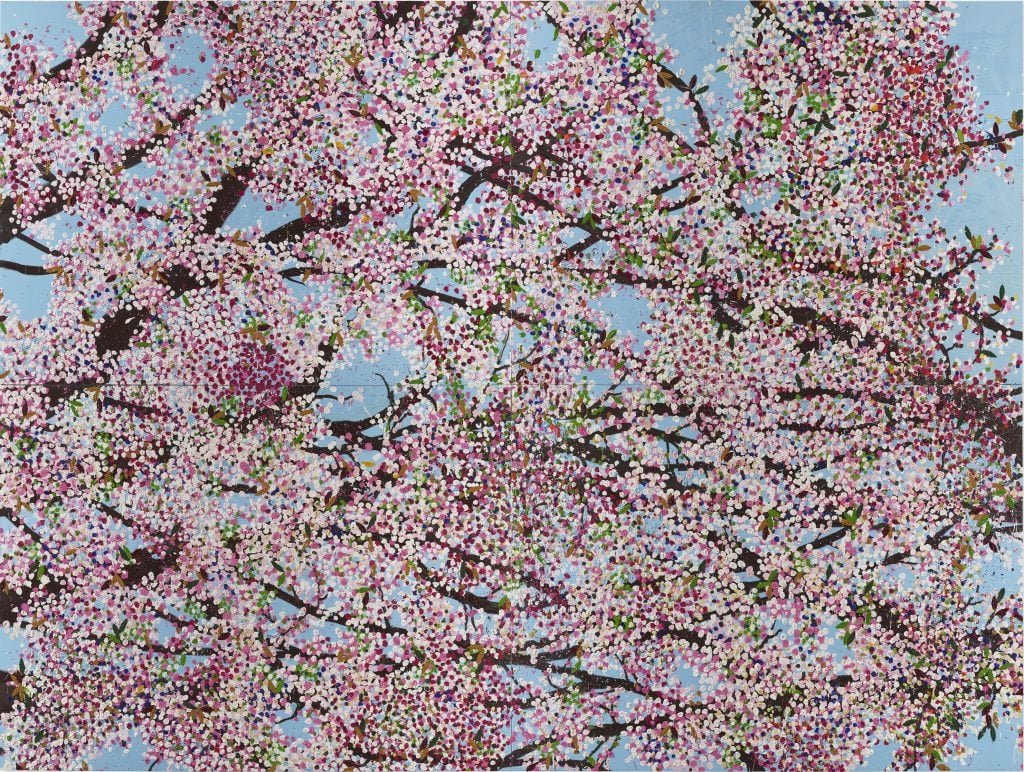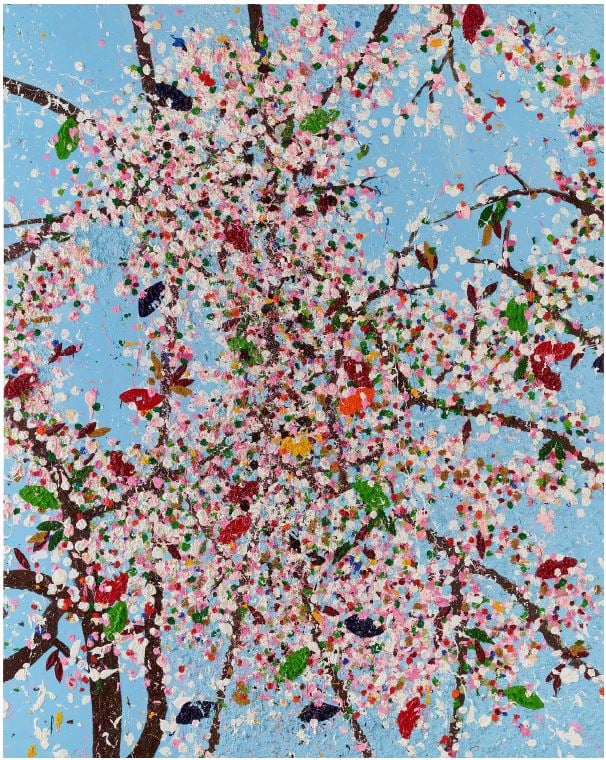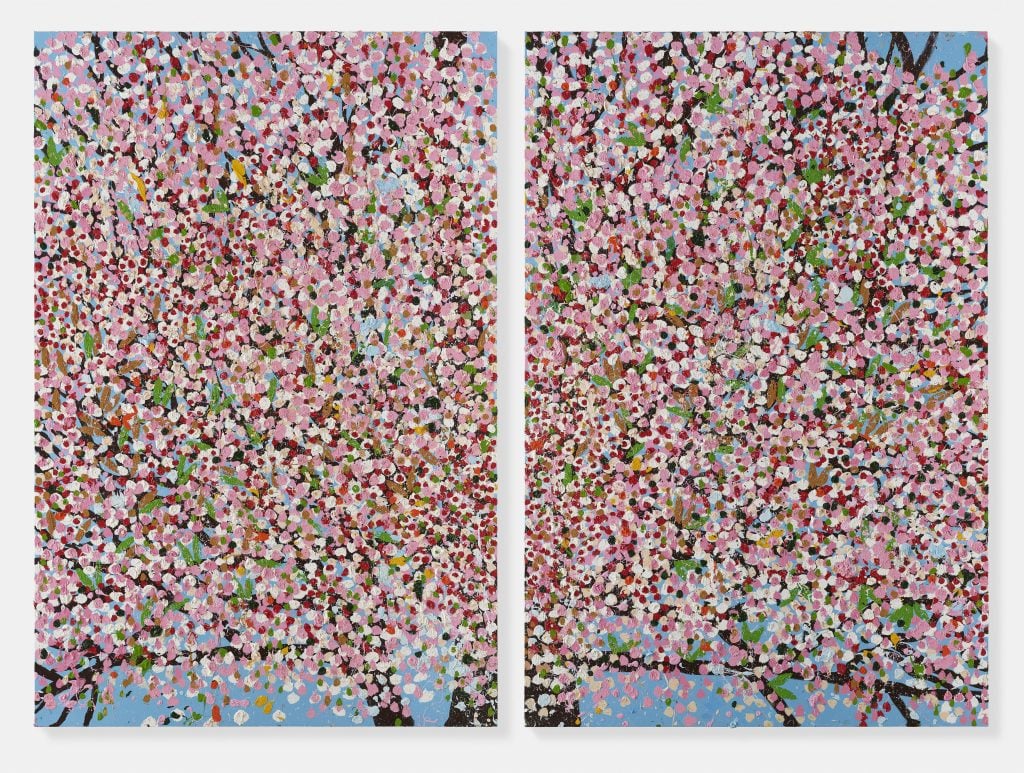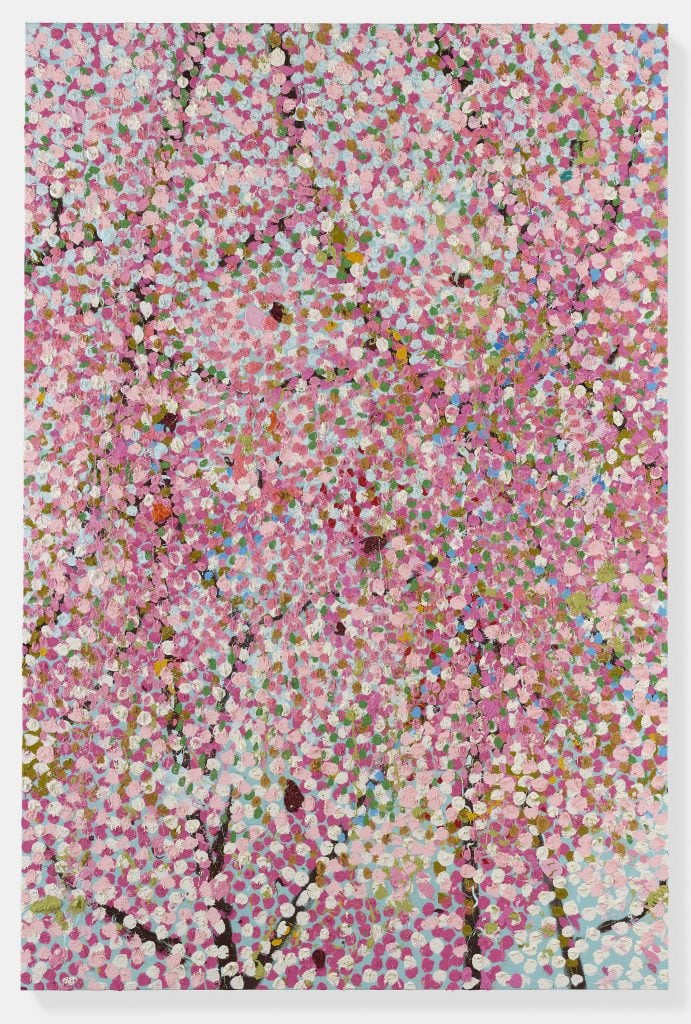On View
Damien Hirst’s Cherry Blossom Paintings, a Sentimental Ode to the Joys of Spring, Are Now on View in Paris
The British artist is showing the works at the Cartier Foundation.

The British artist is showing the works at the Cartier Foundation.

Artnet News

The Fondation Cartier pour l’art contemporain in Paris has opened a new solo show featuring works by Damien Hirst, making it his first museum show in France.
The artist, best known for making artworks out of dissected sharks, pill cabinets, and suspended animals, recently made a return to painting to realize a 107-piece series of canvases featuring flowering cherry blossoms inspired by Pointillism and Impressionism.
Thirty of the works are now on view at Cartier’s Paris-based foundation through next January.
The works present branches laden with blossoms in white, maroon, pink, and green, all depicted in short, thick brushstrokes with elements of gestural painting that nod to Action Painting.

Damien Hirst, Excitement’s Blossom (2020). Photographed by Prudence Cuming Associates. © Damien Hirst and Science Ltd. All rights reserved, DACS 2021
The canvases—single paintings, diptychs, triptychs, quadriptyches and even one hexaptych—are each enveloped in dense, brightly hued blooms that, according to the artist, seek to overwhelm the viewer’s senses, presenting a sort of sublime entry to a flower-filled universe.
Hirst described working on the series as “diving into the paintings and completely blitzing them from one end to the other.”
Though the artist worked on the series over the course of three years, 2020 proved to be an instrumental year for its completion.
“[The pandemic] has given me a lot more time to live with the paintings, and to look at them, and make absolutely certain that everything’s finished,” Hirst said in a statement.
While he spent those months also working on other projects, he would often keep the paintings nearby, seeing them on a daily basis, which he says he would not have had the time to do were it not for spending so much time indoors.

Damien Hirst, Renewal Blossom (2018). Photographed by Prudence Cuming Associates. © Damien Hirst and Science Ltd. All rights reserved, DACS 2021
The show developed from an invitation to Hirst by Hervé Chandès, general director of the foundation, who visited the artist’s studio in 2019 and was captivated by the lush essence of the blossoms paintings. He thought they would look beautiful against the foundation’s interior garden and Jean Nouvel-designed rooms, which the paintings take up entirely.
“I’ve had a romance with painting all my life, even if I avoided it,” Hirst said in a statement. “As a young artist, you react to the context, your situation. In the 1980s, painting wasn’t really the way to go.”
Much of Hirst’s early works were experiments in Abstract Expressionism. But in 1986, he began working on his “Spot Paintings,” which feature colored dots that look machine-made.
Later, he moved to his “Visual Candy” series (1993–95) in response to a negative review from a critic who said his “Spot” works looked like curtain designs.
In 2016, Hirst’s “Colour Space” series took center stage, exploring the infinite possibilities of color, and in 2018, he shifted his focus to his “Veil Paintings,” which feature dabs of shimmering paint that cover whole canvases, emphasizing their surfaces’ depth and color.

Damien Hirst, Fantasia Blossom (2018). Photographed by Prudence Cuming Associates. © Damien Hirst and Science Ltd. All rights reserved, DACS 2021
The “Cherry Blossoms” series, in many ways, is a natural evolution from the “Veil” works, reacting to Hirst’s rediscovery of the joys of painting and what a year in a global pandemic taught him about life and the beauty of the natural world.
“The Cherry Blossoms are about beauty and life and death,” Hirst notes. “They’re extreme—there’s something almost tacky about them. Like Jackson Pollock twisted by love. They’re decorative but taken from nature. They’re about desire and how we process the things around us and what we turn them into, but also about the insane visual transience of beauty—a tree in full crazy blossom against a clear sky. It’s been so good to make them, to be completely lost in color and in paint in my studio.”